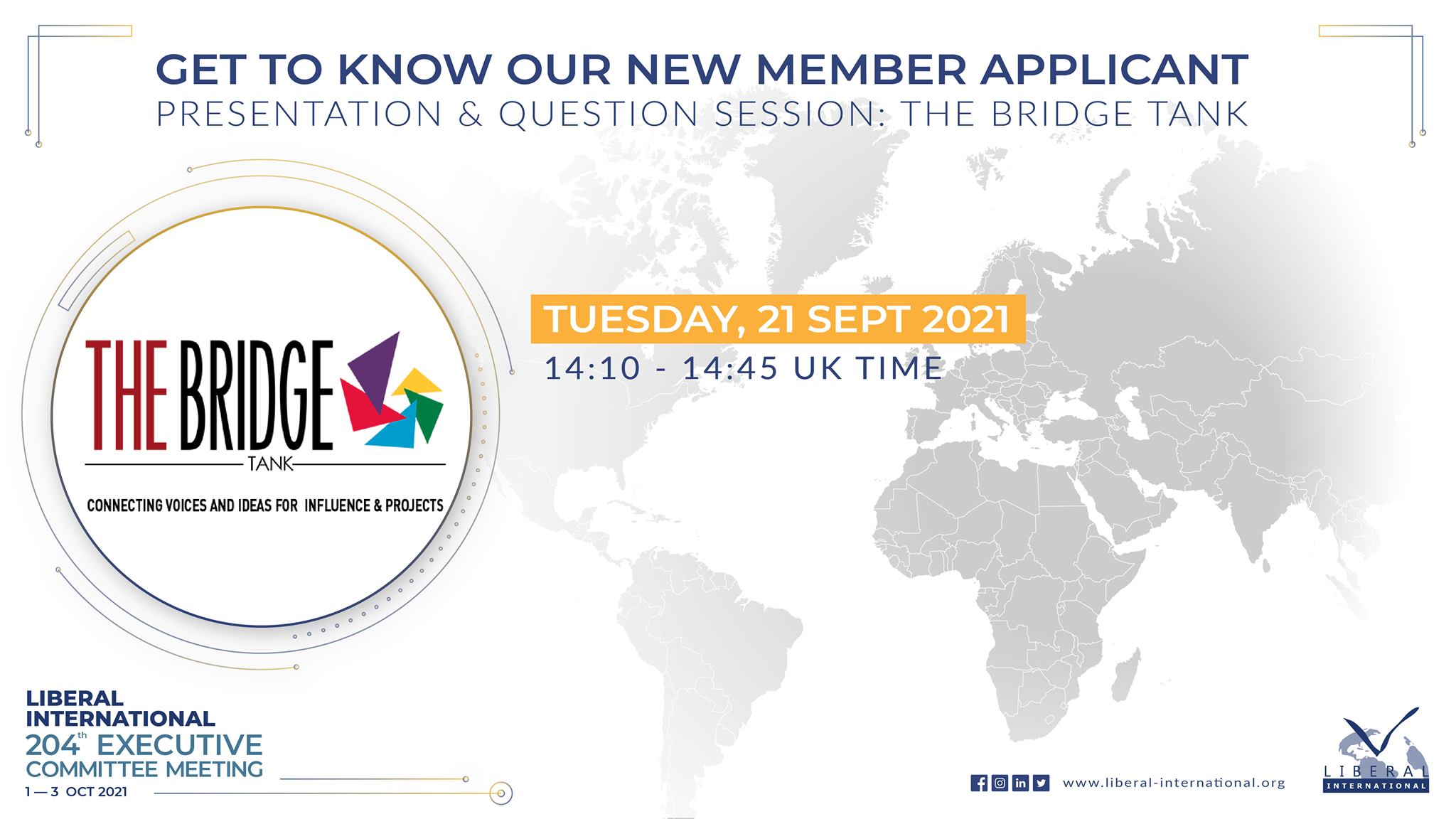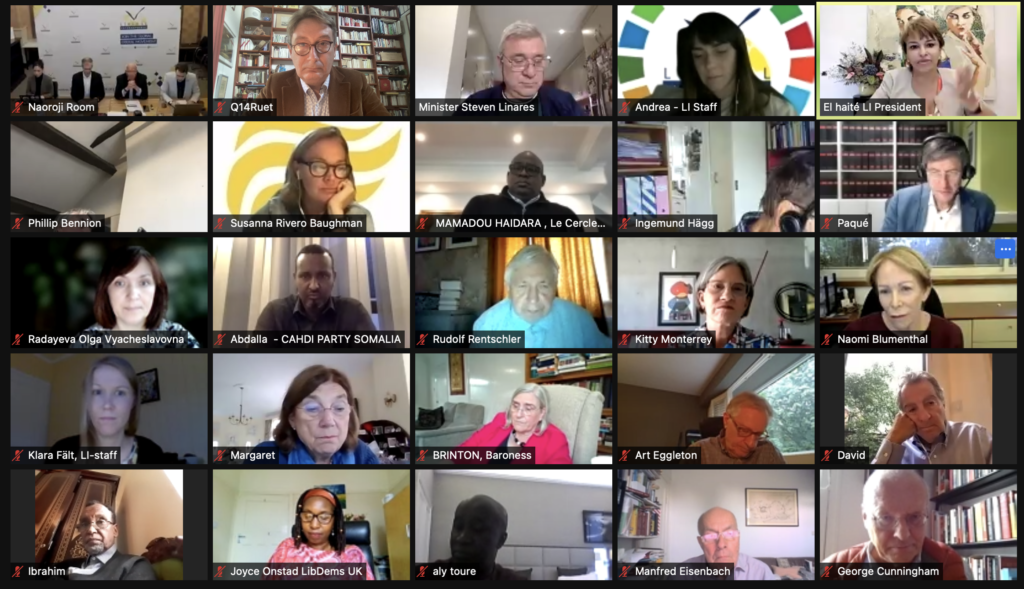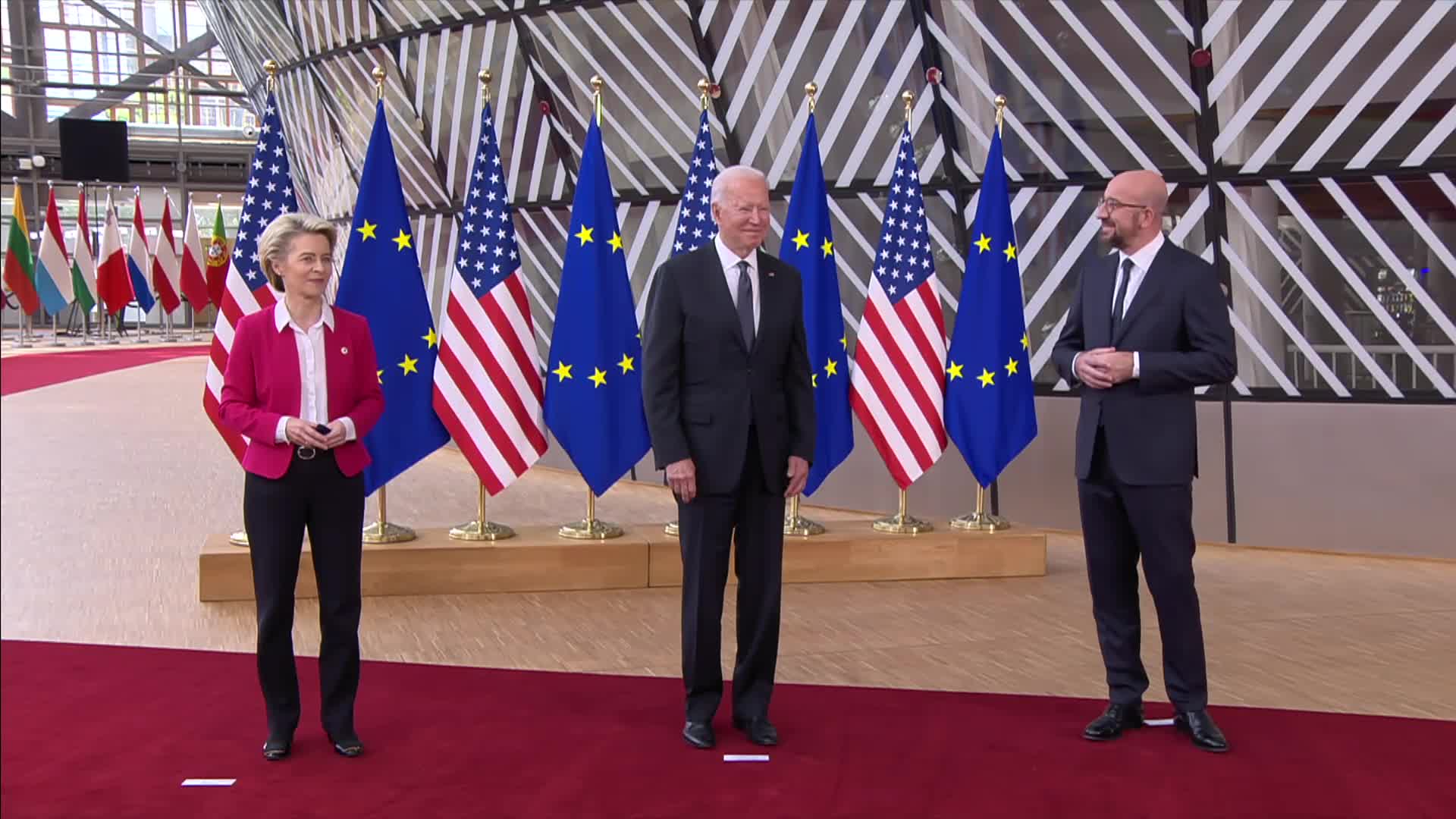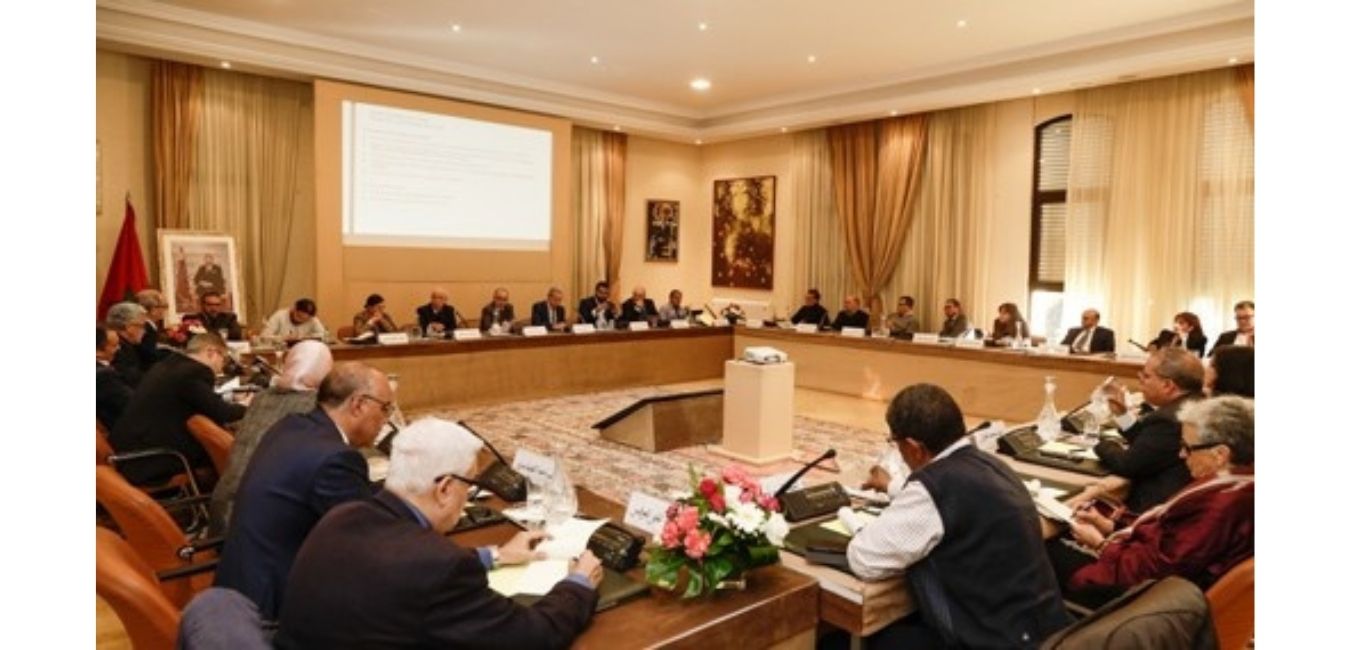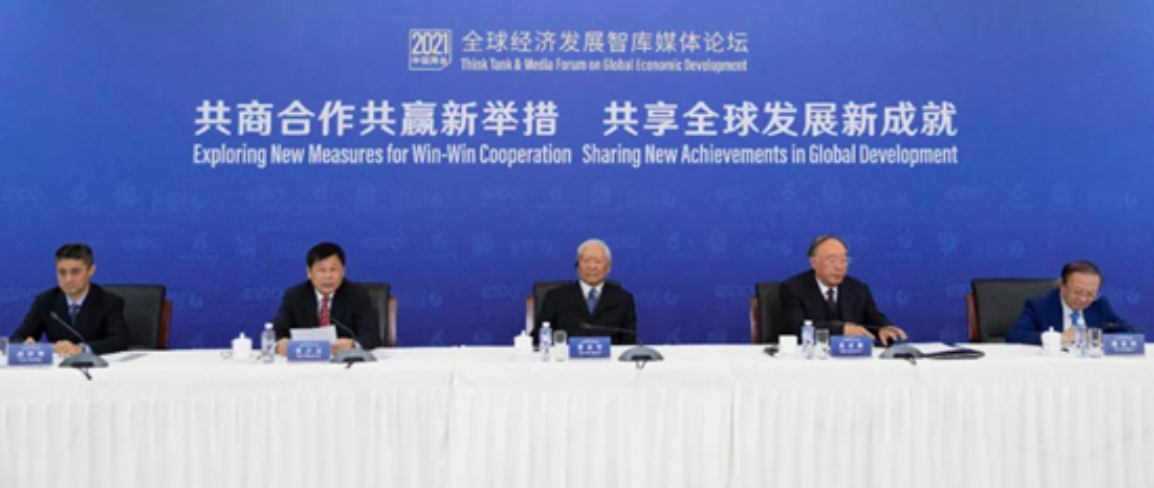EU-US Summit : towards a new transatlantic partnership ?
“America is back” and the Trump years are behind us, as evidenced by the holding of the EU-United States summit in Brussels on June 15, 2021: being the first meeting of this type since 2017, it marked the launch of a renewed partnership and a joint program for cooperation between the EU and the United States, following a sectoral approach. This meeting notably enabled three major commercial achievements to revive and deepen transatlantic trade in a context of Sino-American tensions.
Civil aircraft cooperation agreement closes 17-year dispute
Leaders Joe Biden, Charles Michel, president of the European Council, and Ursula von der Leyen, president of the European Commission, have committed to creating a cooperative framework for large civil aircraft, taking a major step toward ending the dispute over the sector. After 17 years of dispute between Brussels and Washington before the WTO, this agreement initiates a new transatlantic relationship in the aeronautics sector. At the root of the dispute: illegal subsidies granted to aircraft manufacturers Airbus and Boeing. Under the Trump administration, tensions were exacerbated and the WTO authorized the imposition of taxes on $7.5 billion worth of imported European goods and services, including 25% on wine and 15% on Airbus aircraft.
At the end of the summit, the leaders announced the suspension of punitive tariffs imposed on each other, as part of a five-year truce. The resolution of this dispute, which has plagued bilateral relations, is a strong signal that the Biden administration is moving toward a rapprochement that will create a level playing field and address new industrial challenges.
This search for appeasement reflects an attempt to bring the EU on board in the US tug-of-war with China by strengthening the U.S.-European position. Especially since this former duopoly of aircraft manufacturers is now becoming an oligopoly with the entry of the new Chinese player Comac. This common-sense measure therefore also has the potential to counter the Chinese breakthrough in this sector and to challenge China’s perceived unfair competition practices. The idea is also to set up an effective cooperation model to jointly address other challenges posed by China’s economic model. While it is not certain that a compromise will be reached at the end of this truce, there is a real American will to reach an agreement. Indeed, when the dispute began in 2004, Airbus was gaining ground on the international market to the detriment of Boeing, whereas today the threat comes from China and it is time for unity on both sides of the Atlantic.
Negotiations to resolve steel and aluminum dispute underway
Leaders agreed to begin discussions to resolve the steel and aluminum trade dispute and to lift all additional and punitive tariffs by the end of the year. Ursula von der Leyen announced a working group on this issue that has marred transatlantic relations since Donald Trump announced in 2018 the imposition of taxes of 25% on European steel imports and 10% on aluminum imports, provoking European countermeasures in return.
Lifting these taxes in the spirit of appeasement that prevails today would be a much-awaited political gesture by the EU, which expects strong actions beyond intentions. However, this diplomatic gesture should not change the face of European trade, nor turn the European steel and aluminum market upside down, as prices have risen in an unprecedented manner over the past six months, drowning out the impact of the US taxes.
Moreover, the actual resolution of the conflict is likely to be thorny, as the EU does not have a tariff and trade logic but a border tax logic that is different from the United States. The partnership is not self-evident and leaves the door open to a possible rapprochement with China, whether on the American or European side.
The establishment of an EU-US Trade and Technology Council
It is no longer a question of Europe and the United States entering into a free trade logic, as the Transatlantic Trade and Investment Partnership negotiated since 2013 is no longer relevant. However, a Trade and Technology Council will be created to provide a platform for cooperation on trade, investment, technology, digital issues and supply chains. It embodies a willingness to cooperate in developing compatible and international standards and to promote innovation while avoiding unwarranted new trade or technical barriers. It will enable the partners to align on global technology issues, such as artificial intelligence, cybersecurity, clean technologies… Both sides have already committed to a partnership on rebalancing semiconductor supply chains as a priority.
This third announcement is both the most imprecise and the most structuring for the future of EU-US bilateral relations. At a time when a technological war seems to be underway with China, the issue of technological coordination is central. After a first American and commercial globalization, which was undermined by the Trump years, Biden now has the project of knitting a new one, which will take the form of technological liberalization.
The African diaspora recalled by the continent?
The sustained growth of the last two decades and the two global crises of 2008 (Subprimes) and 2020 (Covid-19) have revealed new challenges on a global scale, which are illustrated in Africa by a sustainable modernisation challenge. The role of the diaspora in accessing international finance is one of the keys to Africa’s challenges. Morocco published this Tuesday, May 25, 2021 its report entitled “The New Development Model, unleashing energies and restoring confidence to accelerate the march towards progress and prosperity for all”.
Read here the french paper : La diaspora africaine rappelée par le continent ?
China “Two Sessions” : the Bridge Tank co-organizes the Think Tank & Media Forum on Global Economic Development
A Forum on Global Economic Development on the occasion of the Two Sessions in Beijing
Together with its Chinese partners, the China International Publishing Group and the China Institute for Innovation & Development Strategy, as well as the Prospective & Innovation Foundation, the Bridge Tank co-organized on March 8 a hybrid Forum on the sidelines of the Two Sessions.
On this occasion, Joël Ruet spoke alongside Wei Jianguo, former vice-minister of Commerce in China and vice-chairman of the China Center for International Economic Exchanges, Cai Jiming, deputy at the People’s National Assembly and director of the Central Committee of the China Association for Promoting Democracy, and Zhang Yuyan, member of the 13th National Committee of the Chinese People’s Political Consultative Conference and director of the Institute of World Economics and Politics.
Jean-Pierre Raffarin, former Prime Minister of France, opened this webinar alongside four Chinese vice-ministers and the deputy speaker of the House of Representative of Argentina. For almost three hours, representatives of more than ten countries, ranging from Russia to India, from Brazil to South Africa, explored new avenues of thoughts, in particular in favor of multilateral cooperation, global economic recovery supported by innovation and reform of global economic governance. The role of international think tanks in building platforms for dialogue was highlighted, and presented as an essential strength in building a community on a humanity scale.
Chinese media articles China Today, China.org, China Institute for Innovation and Development Strategy covered this event in particular.
Opening of the Forum by Jean-Pierre Raffarin: against the temptation of isolationism, an international cooperation based on innovation
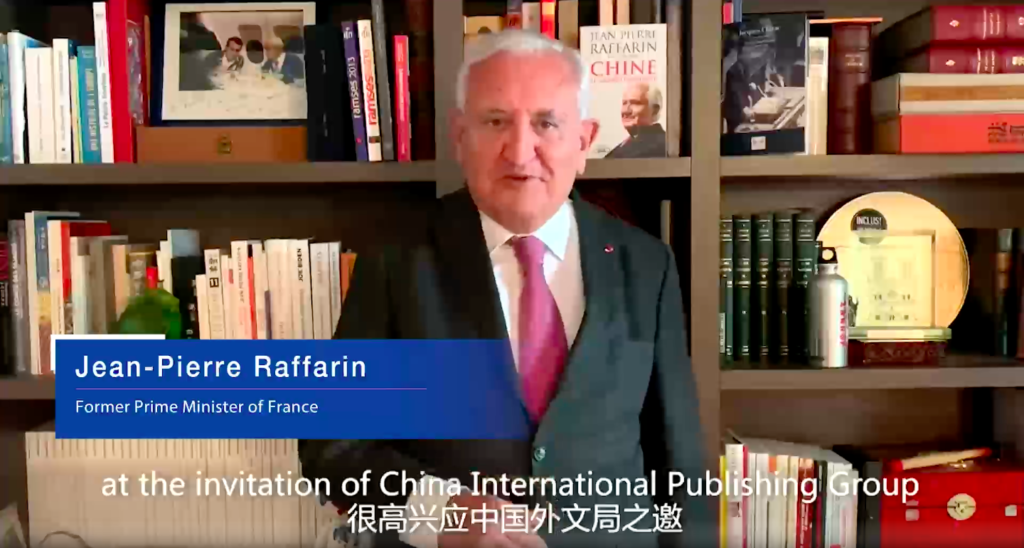
In his remarks, the former French Prime Minister said that sharing of experiences and mutual understanding were essential to achieve peaceful development, a common goal for all countries. As a global crisis exacerbates the need for a coordinated response to global challenges, he stressed the dangers of a temptation to unilateralism and protectionism. Emphasizing the role of innovation, he argued that each country should actively conduct international cooperation while safeguarding its own sovereignty. He mentioned in particular the fight against climate change, referring to the joint efforts of France and China, a strong signal in favor of a global consensus for green development.
From crisis to opportunity for renewal, according to Chinese speakers Wei Jianguo, Zhang Yuyan and Cai Jiming
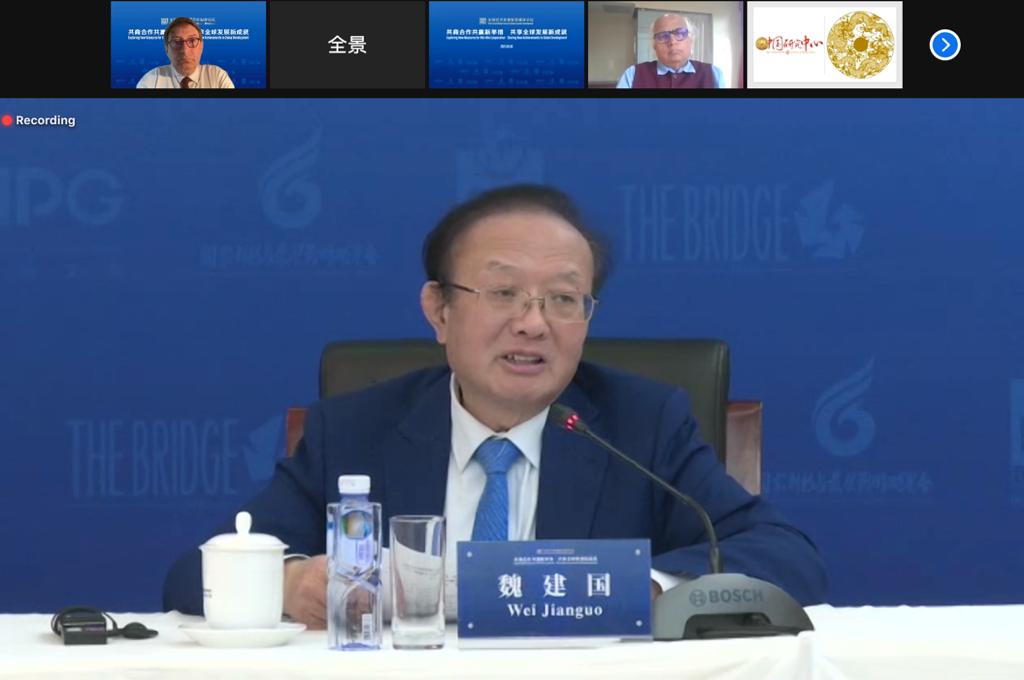
Former vice-minister of Commerce Wei Jianguo said China’s “dual circulation”, a pillar of the 14th Five-Year Plan launched at the same time, will bring new opportunities for global economic development. According to him, beyond the crisis it is going through, the world is entering a new era of globalization, where China must play a crucial role.
But experts have set it against a less optimistic scenario, warning of current systemic risks threatening the global economy, such as inflation, the symptoms of which – sharply rising commodity prices – are already visible. Inflation and climate change therefore emerged as two challenges of common interest to be tackled together.
Zhang Yuyan called for renewed international cooperation, which involves working together on the issue of global governance. Indeed, discussions remain to be conducted, and this responsibility falls to the great world powers, which must find the right balance between strategic autonomy and common interests.
Cai Jiming emphasized the importance of building a fair and sustainable world trading system, based on the notion of comparative interest in the international division of labor, firmly opposing isolationist tendencies that threaten the balance of world trade.
China’s commitment in Global Security and Sino-European Cooperation : Joël Ruet’s Intervention
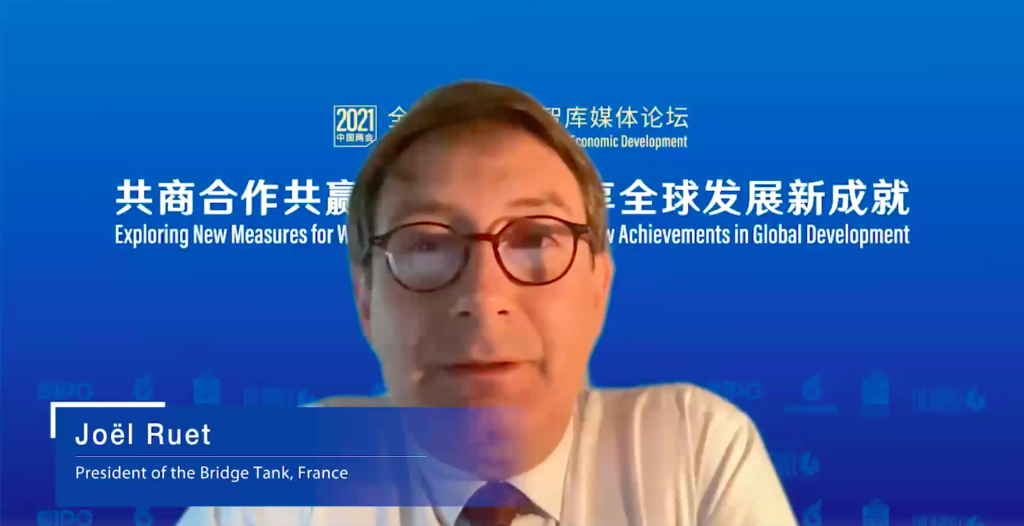
Joël Ruet, chairman of the Bridge Tank, said China must adopt more multilateral ways to clarify its position in the security issue and create a stable external environment. Speakers also agreed on the idea that China should play a role commensurate with its economic weight in global governance.
He referred to the pre-investment Agreement concluded between China and the EU, symbol of the opportunities that can emerge from a crisis, while warning of two priorities that should not be overlooked. Indeed, he targeted two areas where Sino-European cooperation is fundamental : the environment, where the ambitious words of the heads of state must be implemented through acts in the perspective of the COP26, and industrial cooperation, that the European and Chinese industries and businesses see as very promising.
The take of The Bridge Tank on the 2021 Two Sessions – “Dual circulation”, high-quality development, disappointing environmental objectives…
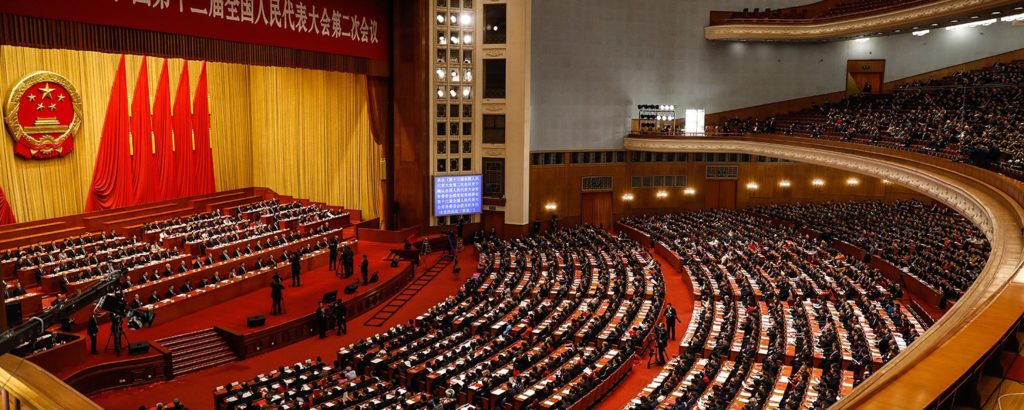
The Two Sessions designates the two annual plenary meetings of the National People’s Congress and the National Committee of the Chinese People’s Political Consultative Conference. After a year of pandemic which had postponed this meeting in May 2020, the Chinese leaders were keen this year to launch it on March 5, as if to embody the exemplary resilience of the country and the regained normality of the regime’s institutions. Plus, it is marked by the launch of the 14th Five-Year Plan 2021-2025 and the 100 years anniversary of the Chinese Communist Party.
Among the highlights of this event, Prime Minister Li Keqiang has set a growth target of 6% for 2021. This moderate figure shows that the priority will be less focused on an attractive GDP – the IMF is banking on an 8% recovery – than on stable growth in a context of uncertainty, and on three pillars: “reform, innovation, and high quality development”. Also, the budget allocated to research and development will increase by more than 7% per year over the next five years, to achieve breakthroughs in future technologies and allow China to gain strategic autonomy. Another priority of the regime is to upgrade the supply chain and to promote domestic consumption, especially in the automotive and household appliances sector.
In fact, both the Two Sessions and the 14th Five-Year Plan have as a common thread the development paradigm of “dual circulation”. This notion denotes a two-pronged development strategy that requires both internal and external market support to stimulate long-term consumption patterns. The domestic cycle is particularly emphasized while it is complemented by an international cycle, with foreign trade and investments abroad. This objective of betting on the huge Chinese domestic market is rooted in a desire to hedge against external shocks, in the context of rising diplomatic tensions and instability in the world economy.
Li Keqiang also stopped on the environmental issue: he called for the promotion of the greening of lifestyles and production. For example, one of the targets for 2021 is to achieve a rate of 70% for the use of clean energy for heating. The 14th Plan calls for China to reduce its energy consumption per unit of GDP by 13.5% and CO2 emissions by 18%. Yet the experts say that the objectives mentioned do not represent a real acceleration to achieve the carbon neutrality expected in 2060, for lack of concrete means. For example, the Double Assembly as well as the 14th Five-Year Plan introduced the idea of a “cap on CO2 emissions”, without actually setting one. While it is encouraging that a component dealing with climate change is for the first time adopted in a national-level plan, these initial environmental indications are therefore often perceived as ambiguous, even disappointing.

